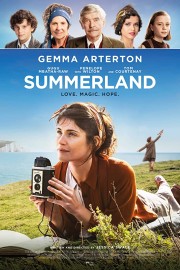Summerland
“Summerland” begins like it’s going to be one thing, and then, on a dime, becomes something different. When it does that, my entire outlook on the film shifted. What started out as something of a familiar “odd couple” premise turns into an emotional story of what it means to become a parent, and how to see yourself as responsible for other people’s well-being. It’s a film that isn’t a bad one to have around right now.
The film begins with an old woman (Penelope Wilton) at a typewriter. She is writing a story out when some kids come to her door, and she is a curmudgeon to them before going back to her work. We then transition to her as a younger woman, and now, played by Gemma Arterton. She is Alice, and she is known in town as having something of an attitude; the kids see her as a witch, and the other adults stay far away. One day, she is informed that she is to take in Frank (Luke Bond), an evacuee from London during the air raids. She’s reluctant, and wishes to have him reassigned to someone else, but over the course of time, she comes to care for him, although when terrible news comes in about his parents, she isn’t sure how to handle it.
Summerland is the word pagans used for heaven, as Alice tells Frank, and the magical and fantastic plays a role in the film, but not in a way you’re expecting. This isn’t a fantasy like “Heavenly Creatures” or “Pan’s Labyrinth,” but Frank’s childlike imagination is a big part of how he and Alice connects. They go to a bluff by the sea, and look out along to skyline and the clouds, and the patterns he sees seem to give weight to the type of things Alice uncovers in her work, and it’s part of what wins her over with him. It allows for the times when tragedy hits to feel more powerful, because we realize how much the truth could hurt him. But it also shows how much Alice should trust him to be able to handle those truths. When she doesn’t, the outcome could be even worse than if she were just honest with him. This is a very compelling story idea the film explores quite well.
The story summary a couple of paragraphs up is only part of “Summerland,” however, and it’s in the way writer-director Jessica Swale builds this film off of the “adult having to learn to be a parent” premise, and how it ties into the why of Alice’s demeanor at the start of the film, that makes the film succeed. Without getting into all the details, Alice was once in love with a woman (played by the luminous Gugu Mbatha-Raw) and, needless to say, that’s a relationship that isn’t exactly built to last during the early 20th Century. Arterton and Mbatha-Raw are wonderful together, and seeing how that relationship ends, and how Arterton shows Alice- who chronicles myths and folklore- grow fond of Frank- makes the film’s final third land, when she is faced with some of the toughest responsibilities a parent will ever have to face, powerfully. It elevates the film from a sweet period film, with a tired premise, to an emotional story of having purpose, and putting other people’s happiness in your hands, one that Swale pulls off effortlessly.










